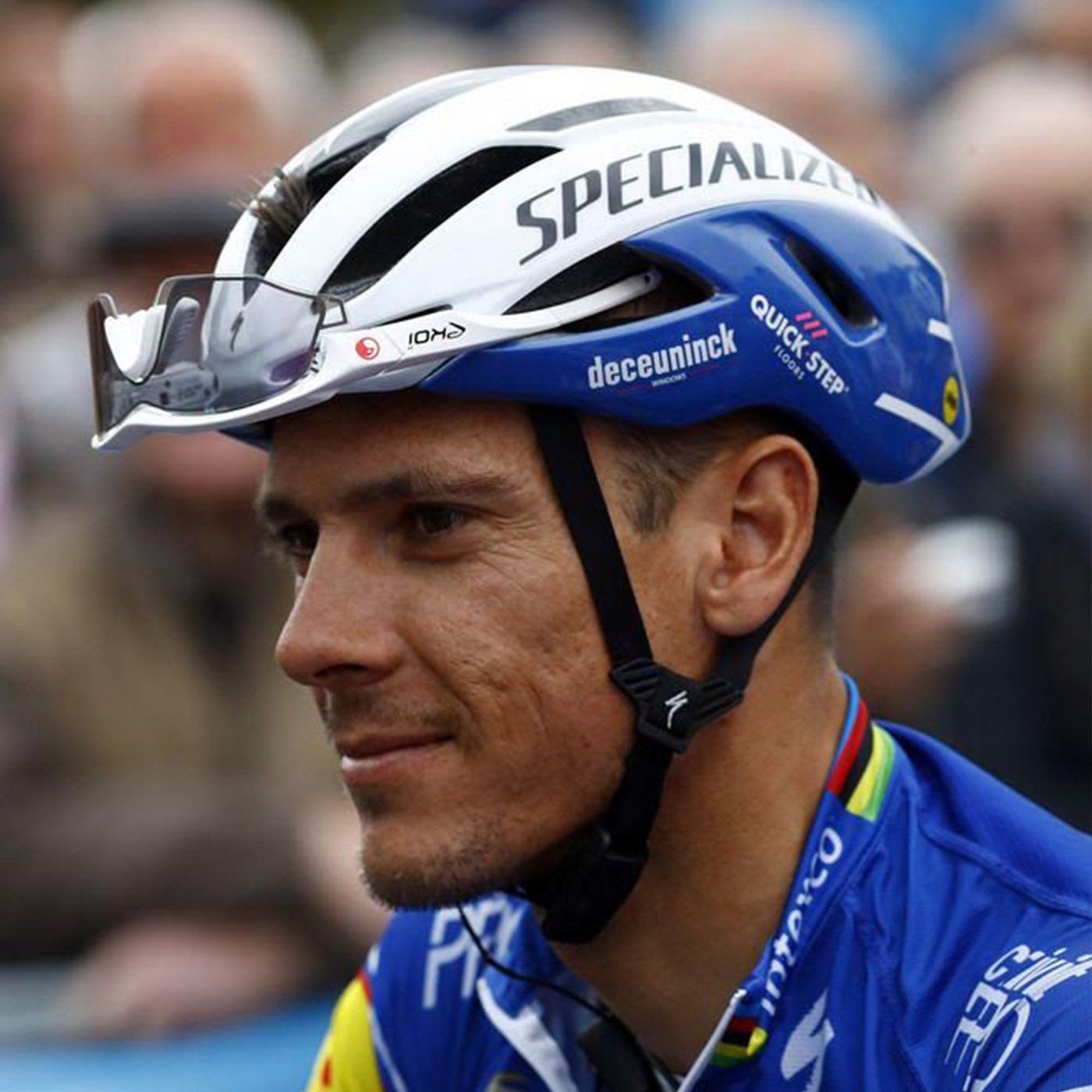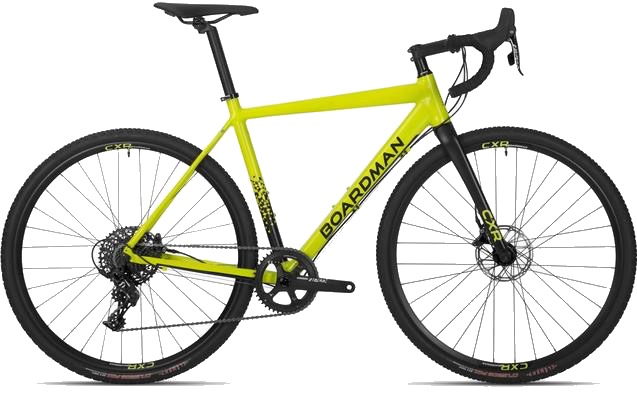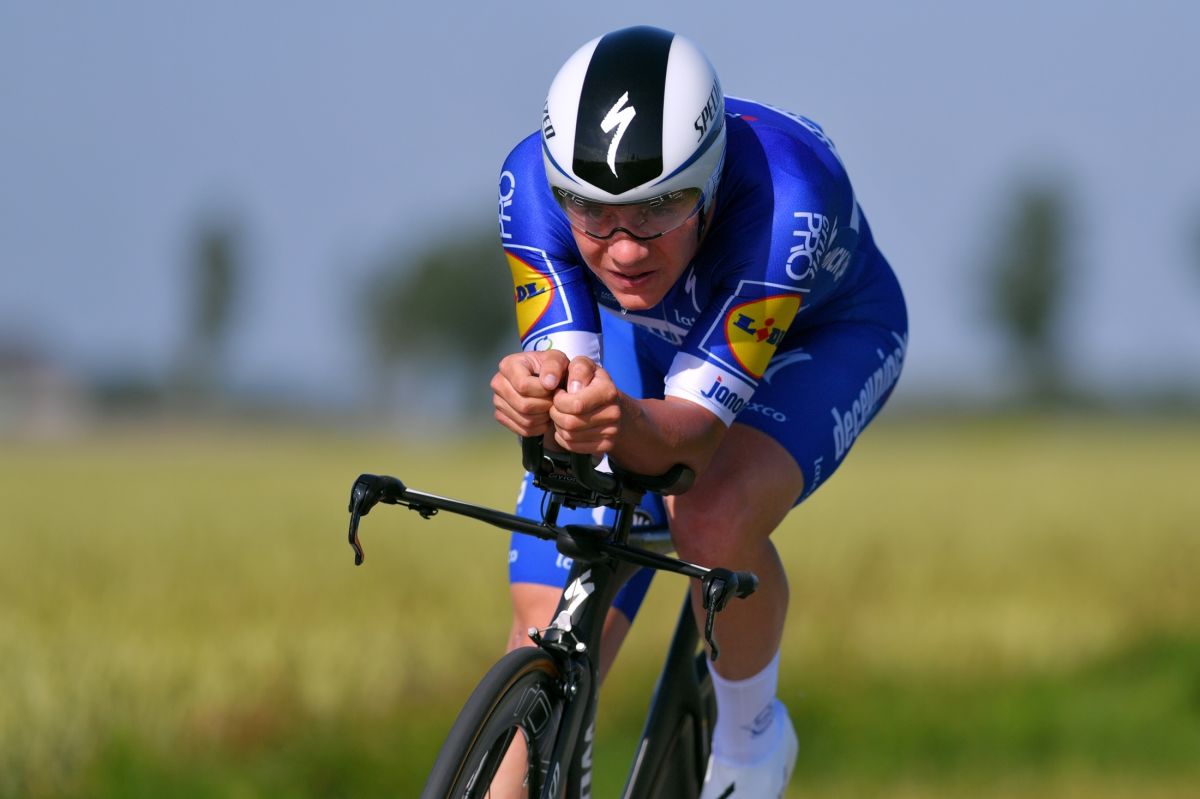Yes, it’s an ‘e’ world – cigarettes, cars, bikes and now … sunglasses. Bread, dosh, dough, moolah, shekels, that’s the subject of this rant.
No, it’s not April 1st – EKOI E-LENS shades have an electronic chip integrated into the photochromic lens which will immediately change from dark tint to clear or vice versa.
‘Charge lead supplied.’
At £224 I didn’t think they were too sore, given Assos want £300 for, well, frankly, not very much – a bit of curved plastic and two legs.
The EKOI glasses aren’t as trendy as Oakley – but then none are – but you get their ‘QuickStep limited edition’ shades for £89.52, which is a bargain these days.
And if they’re good enough for Elia, Michael, Max, Yves, Philippe and the boys, well…

On social media the other day I saw someone contend that perhaps the crisis that faces time trialling – i.e. the participation age range becomes older by the season, with a case in point being the Scottish ‘25’ Mile TT title: three youths, one junior – is as a result of the fact that the youngsters think that to compete on equal terms they MUST have a machine which will cost upwards of five grand.
The days of buying a second hand frame and begging/bartering components until you could buy decent equipment for it are long gone.
A ‘cotter pin,’ what’s that?
The solution is difficult to arrive at.
We live in a much more affluent society then the one I grew up in but folks on lower incomes simply cannot afford to pay five thousand pounds for a bike – with the latest offering from Pinarello, the undoubtedly stunning F12, setting you back that amount, frameset only.
What’s the answer?
It’s hard to pluck one out of the air but perhaps if governing bodies, clubs and mentors made youngsters aware that you don’t have to spend the kind of money which would buy you a good car, just to ride a 10 mile time trial or a local criterium.
The 2015 CTT 10 mile champion, Richard Bussell (RST Sport AeroCoach) won that race with a time of 19:36 on a bike which cost him £1,000 through judicious purchase of new and second hand components.
Something has to change or the sport will become the preserve solely of middle aged, affluent folks.

But carrying on with the theme of bike costs, for my sins I still subscribe to Cycling Weekly – I have done since the summer of 1971 and worry I might miss something if I stop buying it – and their ‘buyers guide’ for machines around £1,000 is an eye opener with the likes of Ribble, Boardman, Cube and Specialized all offering highly respectable machines for around a grand (no doubt this price point is influenced by the ‘Cycle To Work’ scheme upper ceiling).
And if you stretch that to £1,500 there are some seriously nice machines on offer.
But cyclists, like fashionistas are ‘label snobs’ with ‘De Rosa’ cooler than ‘Boardman’ and ‘105’ having no chance against ‘Super Record.’
At the recent Spokes Cycles’ Junior Tour of the Kingdom, the hardware on show wouldn’t have disgraced a pro sign-on.
But if you have the dough, you want the best for your offspring and it gets them out of the bedroom, and endlessly playing ‘Call of Duty’ or ‘Grand Theft Auto’ then who am I to comment?
But Value For Money isn’t just something that’s relevant when buying a bike.
There’s little doubt that Patrick Lefevere’s Deceuninck QuickStep is one of, if not THE best team around, at last count I had them on 46 UCI wins in 2019.
A big part of Lefevere’s success is down to careful budgeting; he’s never splashed his cash on a big Grand Tour contender whose whole season is based around three weeks in July and who might, crash/get sick/have his head fall off; rather he wants results for his sponsors all year sticking with riders who he knows will do a job for him.
Because of the reputation of the team, riders want to be with him, even if the money isn’t as good.
Gilbert asked to join and was happy to do so on a lower salary than his mega-buck deal at BMC but with performance bonuses in the equation.
Net result is, his career has been resuscitated.

Belgian ‘wonder kid’ Remco Evenepoel could have named his price to just about any team – but Remco’s dad knew Patrick and told him that his boy’s dream was to ride for Deceuninck.
So Monsieur ended up with one of the hottest properties out there at much less than ‘market value.’
Lefevere isn’t interested in ‘potential Tour winners’ who have never set foot on a Grand Tour podium.
He’s much more into men like Stybar and Mørkøv; consistent, hardworking riders who have the team ethos flowing through their veins.
Sky/Ineos operate on a different level, buying up the best young talent, sometimes just so no one else can get to it – word is that Giro winner Carapaz is the latest to take Sirs David and Jimmy’s shilling.
That makes Carapaz, Froome and Thomas as Grand Tour winners then Bernal, Sivakov and Sosa as potential winners.
What would be an interesting calculation at the year’s end though, would be to compare Lefevere’s ‘wage bill/win’ to that of Ineos …

Let’s close on ‘cult’ equipment – Chater-Lea pedals.
‘When I were a lad’ if you couldn’t afford ‘Campag’ pedals then it was ‘Lyotards’ for you, boy!
Those ones with the curvy bit to ‘pick them up’ and which inevitable came apart somewhere like Dunning Glen and had to be re-riveted using the most suitable rock you could find.
Older club men became misty eyed when telling us about post-war stainless steel, British-made Chater-Lea pedals and on occasion you might spot them on a vet’s bike and even to Campag coveters they looked pretty nice.
‘Imagine my surprise’ when I saw that Chater-Lea has risen from the grave and those lovely pedals are now available again.
‘They’d look nice on that fixie I’m going to make out of that Flying Scot track frame,’ I thought to myself, and I wondered about the cost; £250 a pair…
Andrew Richman from Chater-Lea kindly let us know the philosophy and reasoning behind the price-point;
“When we decided to revive the company we did it on the basis that we would use the very finest materials, manufacture everything in the UK and pay our makers a living wage.
“Add onto this small volumes and our wanting to make product with a lifespan beyond a human’s, and you end up “expensive”.
“We tell people repeatedly that we are not producing components for everyone – but they are certainly worth saving up for.
“We also believe there is a very bright future for UK advanced manufacturing and slowly people will come around and not want products knocked out in factories in China and sold for less than the cost of the materials in the West.
Fair enough. Martin really likes the pedals and would consider a pair, but I guess it’s the Ribble sale again for me…



